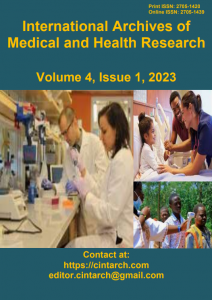
International Archives of Medical and Health Research (IAMHR), pISSN: 2705-1420; eISSN: 2705-1439
April to June 2023 Vol 4(1): pp.20-28 DOI: https://doi.org/10.33515/iamhr/2023.011/03n
Copyright © 2023 C-International Archives
Original Article
Knowledge of COVID-19 and practices regarding its prevention among medical students at Usmanu Danfodiyo University, Sokoto, Nigeria
Nisa’i I. Buhari1*, Kehinde J. Awosan1, Ijapa A. Adamu2, Aisha Attahiru2, Aishatu Abdullahi1, Omika H. Utenwojo1
1Department of Community Health, Usmanu Danfodiyo University, Sokoto, Nigeria
2Department of Community Medicine, Usmanu Danfodiyo University Teaching Hospital, Sokoto, Nigeria
*Corresponding Author’s Email: Nisaiiliyasu@gmail.com
Published July 31, 2023
ABSTRACT
Background: As key stakeholders in healthcare, medical students play a crucial role in understanding the COVID-19 virus and implementing preventive measures to curb its transmission. Aim: This study aimed to investigate the knowledge of COVID-19 and practices regarding its prevention among medical students at Usmanu Danfodiyo University, Sokoto, Nigeria. Materials and Methods: A cross-sectional study was conducted among 249 randomly selected medical students at Usmanu Danfodiyo University Sokoto, Nigeria. A structured self-administered questionnaire was used to obtain information on the research variables. Data were analysed using IBM SPSS version 25 statistical computer software package. Results: Most respondents demonstrated good overall knowledge of COVID-19, understanding its agent and transmission (89.2%), symptoms and signs (98.4%), risk factors and diagnosis (89.4%) and prevention of COVID-19 (99.2%). However, despite overall good knowledge of the disease by most respondents (96.8%), it did not correlate with any of the sociodemographic variables, and only 35.3% practised adequate preventive measures, with fewer consistently wearing masks (32.5%) or vaccinated (6.0%). Factors influencing preventive practices included age, gender, school year, and ethnicity, with younger individuals, females, those in the 3rd school year, and those belonging to the Igbo ethnic group exhibiting higher adherence. Conclusion: Most of the respondents in this study demonstrated good knowledge of COVID-19, but only about a third practised adequate preventive measures, and this was associated with age, gender, year of study, and ethnicity. These findings underscore the need for the government to design targeted interventions to improve adherence to preventive measures, particularly among certain demographic groups.

